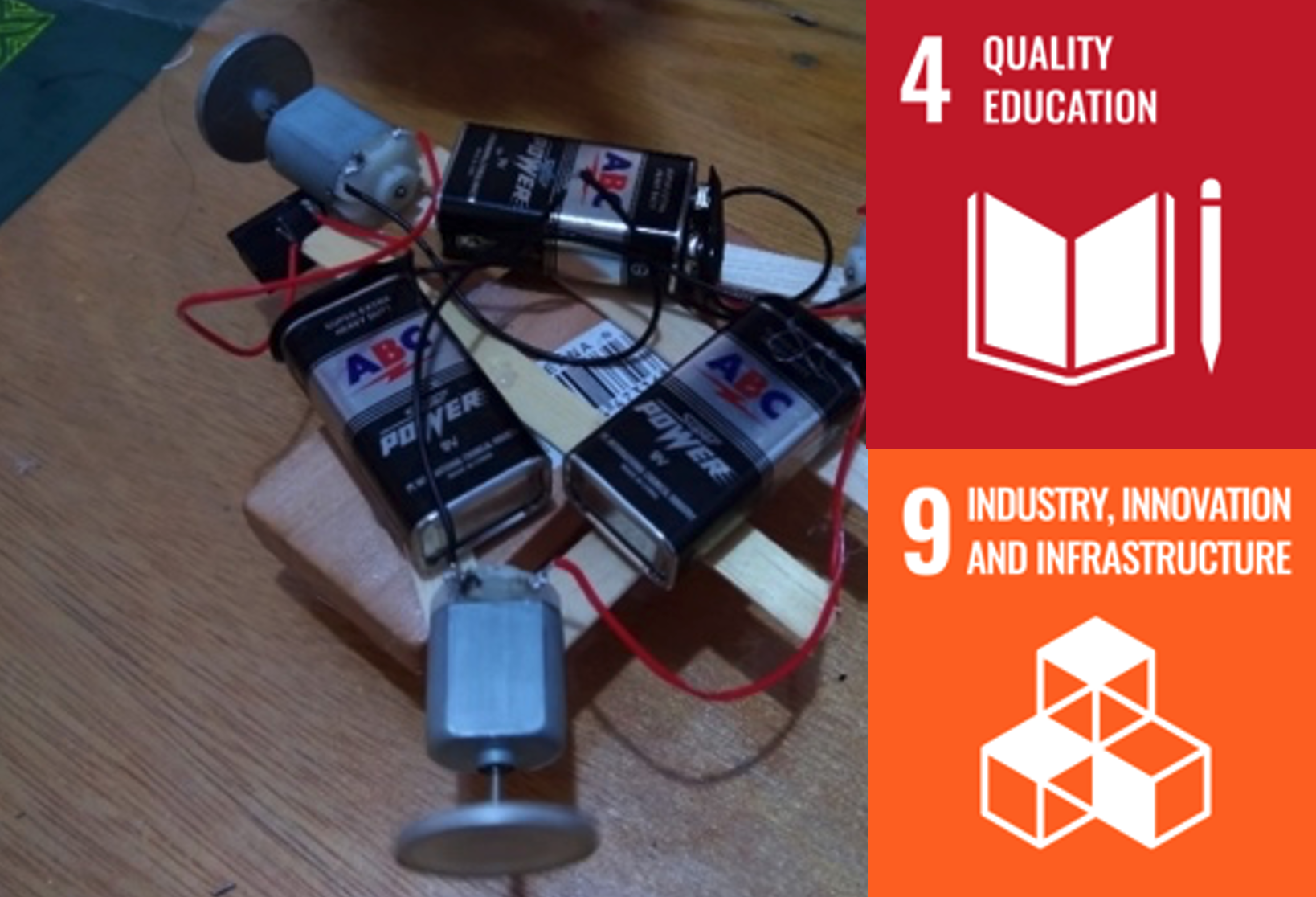Main Article Content
Abstract
Pedagogical and content-related issues are the main challenges in implementing Science, Technology, Engineering, Arts, and Mathematics (STEAM) learning. Moreover, teachers have not fully understood the concept of the STEAM approach. Therefore, it is necessary to enhance their skills in designing and implementing project-based learning, as well as ensuring that learning content is connected to real-life contexts and integrated across disciplines. This community service program aims to develop STEAM learning innovations through project-based and experiential learning models using kirigami, tessellation, and simple robotics. The method is designed based on a partnership concept, grounded in pedagogical co-designing activities, consisting of four stages: pre-activity, socialization, training, and evaluation. The results indicate an improvement in teachers’ understanding of the STEAM approach. Additionally, teachers successfully enhanced their skills in designing STEAM learning using kirigami, tessellation, and simple robotics.
Keywords
Article Details

This work is licensed under a Creative Commons Attribution-NonCommercial 4.0 International License.
References
- Atmojo, I. R. W., Ardiansyah, H. M. R., & Adi, D. Y. S. F. P. (2020). Implementasi Pembelajaran Berbasis Science, Technology, Engenering, Art And Mathematich (STEAM) untuk Meningkatkan Kompetensi Paedagogik dan Profesional Guru SD Melalui Metode Lesson Study. Jurnal Pendidikan Dasar, 8(2), 119–123.
- Choirunnisa, N. L., Suryanti, Istianah, F., Mintohari, & Julianto. (2023). Pengembangan Pembelajaran Berbasis STEAM Bagi Guru Sekolah Dasar History Article. CARADDE: Jurnal Pengabdian Kepada Masyarakat, 6(1), 1–8. https://doi.org/10.31960/caradde.v6i1.1860
- Decorte, B., & Vlieghe, J. (2024). Towards a pedagogical conception of imagination in STEAM education. Ethics and Education, 19(2), 218–232. https://doi.org/10.1080/17449642.2024.2361560
- Diego-Mantecon, J. M., Prodromou, T., Lavicza, Z., Blanco, T. F., & Ortiz-Laso, Z. (2021). An Attempt to Evaluate STEAM Project-Based Instruction From a School Mathematics Perspective. ZDM - Mathematics Education, 53(5), 1137–1148. https://doi.org/10.1007/s11858-021-01303-9
- Duong, N. H., Nam, N. H., & Trung, T. T. (2024). Factors affecting the implementation of STEAM education among primary school teachers in various countries and Vietnamese educators: comparative analysis. Education 3-13. https://doi.org/10.1080/03004279.2024.2318239
- El-Dosuky, A. E. (2023). Benefiting from the Art of Japanese Kirigami in Creating Contemporary Children`s wear. Journal of the Textile Association, 83(6), 377–383. https://www.scopus.com/inward/record.uri?eid=2-s2.0-85171336048&partnerID=40&md5=64da6e9866c5820d2aff57953f2ad323
- Ertmer, P. A. (1999). Addressing First- and Second-Order Barriers to Change: Strategies for Technology Integration. Education Technology Reseacrh and Development, 47(1), 47–61. https://doi.org/10.1007/BF02299597
- Fitria, Y. (2018). Perubahan Belajar Sains Siswa Dasar Pada Pembelajaran Terintegrasi (terpadu) melalui Model Discovery Learning. Jurnal Inovasi Dan Pendidikan Sekolah Dasar, 2(2), 52–63. https://doi.org/10.24036/jippsd.v2i2.102705
- Henriksen, D., Mehta, R., & Mehta, S. (2019). Design Thinking Gives STEAM to Teaching: A Framework That Breaks Disciplinary Boundaries. In STEAM Education: Theory and Practice (pp. 62–83). https://doi.org/10.1007/978-3-030-04003-1_4
- Irdalisa, I., Amirullah, G., & Dirza, A. F. (2022). Pelatihan Pengembangan Perangkat Pembelajaran Berbasis Steam Bagi Guru IPA. JMM: Jurnal Masyarakat Mandiri, 6(2), 1393–1401.
- Juuti, K., Lavonen, J., Salonen, V., Salmela-Aro, K., Schneider, B., & Krajcik, J. (2021). A Teacher–Researcher Partnership for Professional Learning: Co-Designing Project-Based Learning Units to Increase Student Engagement in Science Classes. Journal of Science Teacher Education, 32(6), 625–641. https://doi.org/10.1080/1046560X.2021.1872207
- Kalaitzidou, M., & Pachidis, T. P. (2023). Recent Robots in STEAM Education. Education Sciences, 13(3). https://doi.org/10.3390/educsci13030272
- Liao, C. (2016). From Interdisciplinary to Transdisciplinary: An Arts-Integrated Approach to STEAM Education. Art Education, 69(1), 44–49. https://doi.org/10.1080/00043125.2016.1224873
- Mäkelä, T., Fenyvesi, K., Kankaanranta, M., Pnevmatikos, D., & Christodoulou, P. (2022). Co-Designing a Pedagogical Framework and Principles for a Hybrid STEM Learning Environment Design. Educational Technology Research and Development, 70(4), 1329–1357. https://doi.org/10.1007/s11423-022-10114-y
- Maryati, T. K., & Ridlo, Z. R. (2023). The analysis of the implementation of RBL-STEM learning materials in improving student’s meta-literacy ability to solve wallpaper decoration problems using local antimagic graph coloring techniques. Heliyon, 9(6). https://doi.org/10.1016/j.heliyon.2023.e17433
- Nahak, K. E. N., Degeng, I. N. S., & Widiati, U. (2019). Pembelajaran Tematik di Sekolah Dasar. Jurnal Pendidikan: Teori, Penelitian, Dan Pengembangan, 4(6), 785. https://doi.org/10.17977/jptpp.v4i6.12527
- Perignat, E., & Katz-Buonincontro, J. (2019). STEAM in Practice and Research: An Integrative Literature Review. Thinking Skills and Creativity, 31(1), 31–43. https://doi.org/10.1016/j.tsc.2018.10.002
- Rodrigues-Silva, J., & Alsina, Á. (2023). Conceptualising and framing STEAM education: what is (and what is not) this educational approach? Texto Livre, 16. https://doi.org/10.1590/1983-3652.2023.44946
- Salas-Pilco, S. Z. (2024). K-12 STEAM Education in Latin America: A Systematic Review. EDUNINE 2024 - 8th IEEE World Engineering Education Conference: Empowering Engineering Education: Breaking Barriers through Research and Innovation, Proceedings. https://doi.org/10.1109/EDUNINE60625.2024.10500534
- Segarra-Morales, A. K., & Juca-Aulestia, M. (2024). Strategies and Skills in STEAM Education Systematic Review of the Literature. Lecture Notes in Networks and Systems, 932 LNNS, 398–411. https://doi.org/10.1007/978-3-031-54235-0_36
- Silva-Hormazábal, M., & Alsina, Á. (2023). Exploring the Impact of Integrated STEAM Education in Early Childhood and Primary Education Teachers. Education Sciences, 13(8). https://doi.org/10.3390/educsci13080842
- Tawfik, A. A., Shepherd, C. E., Gatewood, J., & Gish-Lieberman, J. J. (2021). First and Second Order Barriers to Teaching in K-12 Online Learning. TechTrends, 65(6), 925–938. https://doi.org/10.1007/s11528-021-00648-y
- Thibaut, L., Ceuppens, S., De Loof, H., De Meester, J., Goovaerts, L., Struyf, A., Boeve-De Pauw, J., Dehaene, W., Deprez, J., De Cock, M., Hellinckx, L., Knipprath, H., Langie, G., Struyven, K., Van De Velde, D., Van Petegem, P., & Depaepe, F. (2018). Entegre STEM eğitimi : Orta öğretimdeki öğretim uygulamalarının sistematik bir incelemesi. STEM Education, 3(1), 2.
- Zhou, Y., & Liu, Y. (2023). Discussion on Development Strategy of STEAM Education and Information Integration. ACM International Conference Proceeding Series, 29–34. https://doi.org/10.1145/3591139.3591146

